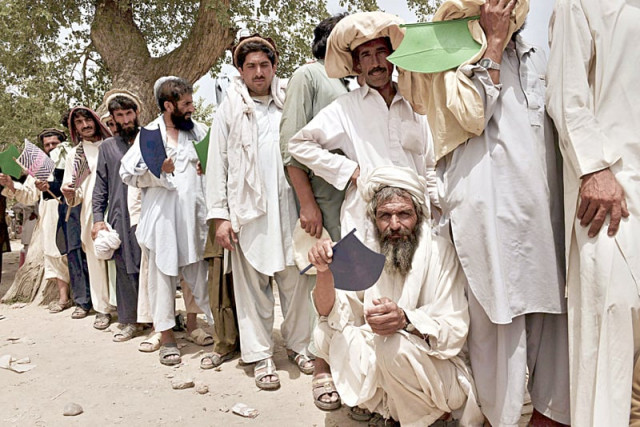Aiding the IDPs: Better coordination among various agencies needed
Discussion at SDPI highlights loopholes in government response, remedial measures.

The plight of internally displaced persons (IDP) was highlighted at a discussion on Tuesday wherein participants urged those involved in relief efforts to increase coordination among themselves instead of taking solo flights.
Speakers of the roundtable discussion, held at Sustainable Development Policy Institute, said there is a huge disconnect among relief organizations and the provincial and federal governments while there are no standard operating procedures regarding assistance work.
Pakistan Tehreek-e-Insaf Member National Assembly Ayesha Gulalai criticised the federal government for launching the operation “without’ taking political parties into confidence”. She said the crisis would have had a far less impact had the federal government launched the operation with the consensus of the Khyber-Pakhtunkhwa (K-P) government.
Gulalai, who hails from South Waziristan Agency, said there are around half a million people who are yet to go back to their homes in the agency after a military operation was launched there in 2009.
She said the K-P government has declared an emergency in the areas where IDPs are arriving, especially in Bannu where basic health units have become active while medical treatment is free for all refugees.
“We have announced a Ramazan package worth Rs350 million and all 389 tube wells in the area are being switched to solar to overcome water scarcity,” she remarked.
Gulalai also urged aid and humanitarian workers to come to the refugees’ rescue and said anyone interested in helping out should consult the provincial government for coordination.
She demanded the government to start immediate rehabilitation and resettlement work in North Waziristan once the operation concludes and announce job and livelihood packages.
Federal Minister for States and Frontier Regions Lt Gen (retd) Abdul Qadir Baloch replied to Gulalai by saying the government was doing everything that was needed at the moment.
“The secrecy behind the operation was needed so the militants would not escape,” he said, adding the provincial government was already getting Rs20 billion from the divisible pool as per the National Finance Commission Award for conflict-hit K-P.
“Besides, we are looking to build more camps as an increased influx of IDPs is expected because there might be more action in other agencies,” he remarked. The former general said there are currently about 1.5 million IDPs of the previous and ongoing operation and the figure reaches more than 5.6 million if the Afghan refugees are counted.
Informing participants of the government’s efforts, Baloch said they have already released wheat worth Rs2.5 billion to the World Food Programme and in total Rs6 billion have been issued to help the IDPs. He dispelled the notion that relief organisations are not allowed in the area and stated that security checks hardly take two days.
Defence analyst Ayesha Siddiqa expressed dismay over relief work being carried out in the area by banned outfits. She said there was a need to seriously review the role of such outfits in disaster-hit areas as it ultimately leads to building a narrative that does more harm to the state than good.
Baloch replied to the statement by saying that no outfit was indoctrinating people in the area and that the ‘good work’ of people should be appreciated.
Published in The Express Tribune, July 16th, 2014.



















COMMENTS
Comments are moderated and generally will be posted if they are on-topic and not abusive.
For more information, please see our Comments FAQ